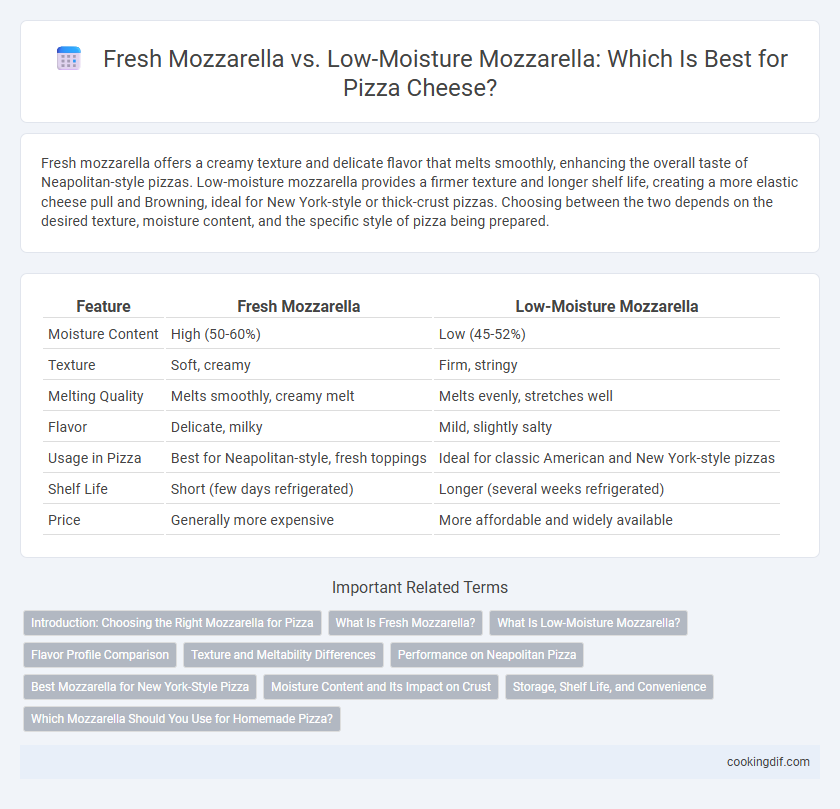Fresh mozzarella offers a creamy texture and delicate flavor that melts smoothly, enhancing the overall taste of Neapolitan-style pizzas. Low-moisture mozzarella provides a firmer texture and longer shelf life, creating a more elastic cheese pull and Browning, ideal for New York-style or thick-crust pizzas. Choosing between the two depends on the desired texture, moisture content, and the specific style of pizza being prepared.
Table of Comparison
| Feature | Fresh Mozzarella | Low-Moisture Mozzarella |
|---|---|---|
| Moisture Content | High (50-60%) | Low (45-52%) |
| Texture | Soft, creamy | Firm, stringy |
| Melting Quality | Melts smoothly, creamy melt | Melts evenly, stretches well |
| Flavor | Delicate, milky | Mild, slightly salty |
| Usage in Pizza | Best for Neapolitan-style, fresh toppings | Ideal for classic American and New York-style pizzas |
| Shelf Life | Short (few days refrigerated) | Longer (several weeks refrigerated) |
| Price | Generally more expensive | More affordable and widely available |
Introduction: Choosing the Right Mozzarella for Pizza
Fresh mozzarella offers a creamy texture and mild flavor that melts smoothly, ideal for Neapolitan-style pizzas with thin crusts. Low-moisture mozzarella provides a firmer texture and longer shelf life, creating a gooey, stretchy melt perfect for New York-style pizza. Selecting the right mozzarella depends on the desired texture, moisture content, and flavor intensity for your pizza style.
What Is Fresh Mozzarella?
Fresh mozzarella is a soft, white cheese made from whole milk or buffalo milk, characterized by its high moisture content and delicate, mild flavor. It melts smoothly on pizza, creating a creamy texture that contrasts with the firmer, drier low-moisture mozzarella. Preferred for Neapolitan-style pizzas, fresh mozzarella provides a distinctive, fresh taste and a tender, slightly elastic bite.
What Is Low-Moisture Mozzarella?
Low-moisture mozzarella is a semi-soft cheese made by removing most of the whey, resulting in a drier, firmer texture with a higher melting point than fresh mozzarella. It is favored for pizza due to its ability to brown evenly and create a stretchier, chewier cheese pull without releasing excess moisture that can soggy the crust. Pizza chefs often prefer low-moisture mozzarella for consistent meltability and longer shelf life compared to fresh mozzarella.
Flavor Profile Comparison
Fresh mozzarella offers a creamy, milky flavor with a delicate texture that melts into a smooth, rich topping ideal for classic Neapolitan-style pizza. Low-moisture mozzarella features a more concentrated, slightly tangy taste and a firmer consistency that provides better stretch and browning, making it popular for New York-style pizzas. Choosing between the two cheeses impacts the pizza's overall flavor complexity and melt quality, with fresh mozzarella delivering subtle richness and low-moisture mozzarella adding boldness and texture.
Texture and Meltability Differences
Fresh mozzarella offers a creamy, moist texture with a soft, pillowy melt that creates a rich, gooey pizza experience. Low-moisture mozzarella provides a firmer texture and a more elastic melt, resulting in a chewier bite and better browning on the pizza crust. The higher water content in fresh mozzarella enhances creaminess but can lead to a slightly soggy crust, while low-moisture mozzarella balances meltability with structural integrity for a classic pizza finish.
Performance on Neapolitan Pizza
Fresh mozzarella offers superior meltability and a creamy texture essential for authentic Neapolitan pizza, providing a delicate balance of moisture that prevents the crust from becoming soggy. Low-moisture mozzarella, while firmer and with longer shelf life, tends to release less moisture and produces a stretchier, more elastic cheese layer but lacks the rich creaminess of fresh mozzarella. For true Neapolitan pizza performance, fresh mozzarella enhances flavor complexity and maintains the traditional soft, tender bite that defines this classic style.
Best Mozzarella for New York-Style Pizza
Fresh mozzarella offers a creamy texture and mild flavor with high moisture content, creating a softer, more authentic New York-style pizza experience. Low-moisture mozzarella provides better meltability and browning with a firmer texture, enhancing the classic crispy crust and slight chew typical of New York-style pizza. For the best results, many pizzerias blend fresh mozzarella's creaminess with low-moisture mozzarella's melting properties to achieve the ideal balance of gooeyness and structure.
Moisture Content and Its Impact on Crust
Fresh mozzarella contains higher moisture content, typically around 50-60%, which results in a wetter pizza surface and can lead to a softer, sometimes soggy crust. Low-moisture mozzarella has a moisture level near 45% or less, promoting even melting and a sturdier, crispier crust ideal for traditional pizza styles. Choosing between these cheeses significantly affects the pizza's texture, with fresh mozzarella offering a creamy, tender bite and low-moisture mozzarella providing better structural integrity.
Storage, Shelf Life, and Convenience
Fresh mozzarella offers a creamy texture and melts beautifully but requires refrigeration and has a short shelf life of about 5 to 7 days, making it best for immediate use. Low-moisture mozzarella contains less water, providing a longer shelf life of several weeks unopened, and is convenient for storage and prolonged use without refrigeration until opened. Choosing between them depends on the desired texture for pizza and the need for ease of storage and extended freshness.
Which Mozzarella Should You Use for Homemade Pizza?
Fresh mozzarella offers a creamy texture and mild flavor that melts into a smooth, luscious cheese ideal for Neapolitan-style pizzas with a thin, soft crust. Low-moisture mozzarella provides a firmer texture, longer shelf life, and superior browning with better stretch, making it perfect for thicker crusts and American-style pizzas. For homemade pizza, choosing fresh mozzarella enhances moisture and creaminess, while low-moisture mozzarella brings the classic bubbly, golden finish favored in many pizzeria recipes.
Fresh mozzarella vs Low-moisture mozzarella for pizza cheese Infographic

 cookingdif.com
cookingdif.com